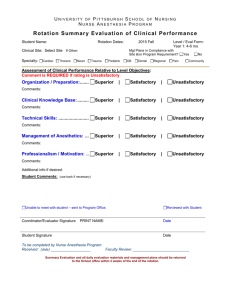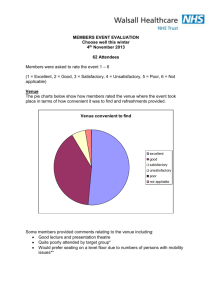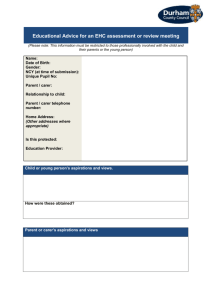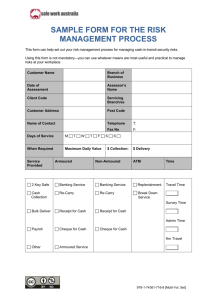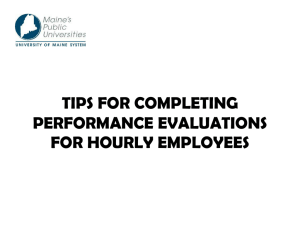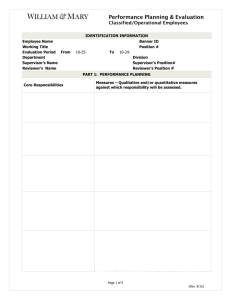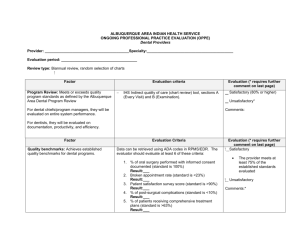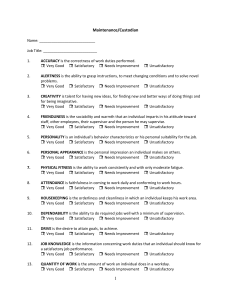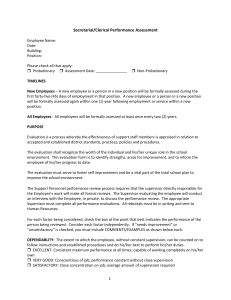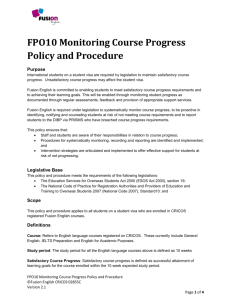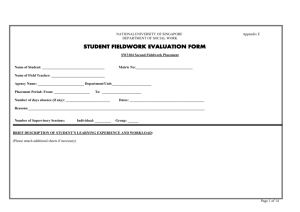Supervisor Report for Primary Rural and Remote Training
advertisement
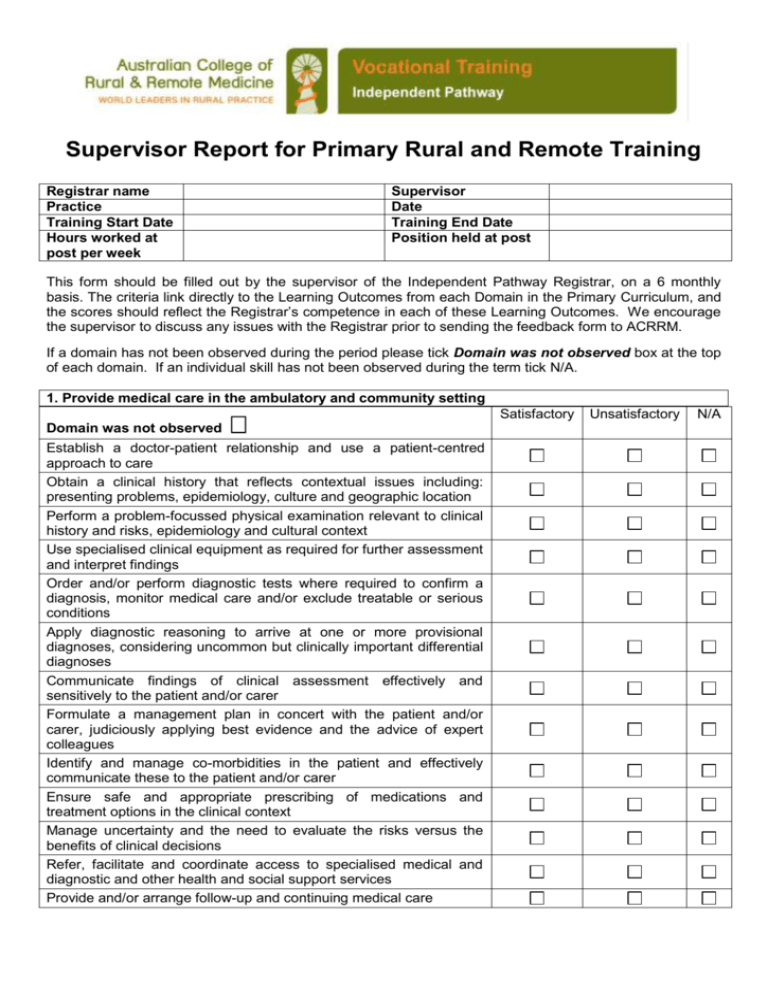
Supervisor Report for Primary Rural and Remote Training Registrar name Practice Training Start Date Hours worked at post per week Supervisor Date Training End Date Position held at post This form should be filled out by the supervisor of the Independent Pathway Registrar, on a 6 monthly basis. The criteria link directly to the Learning Outcomes from each Domain in the Primary Curriculum, and the scores should reflect the Registrar’s competence in each of these Learning Outcomes. We encourage the supervisor to discuss any issues with the Registrar prior to sending the feedback form to ACRRM. If a domain has not been observed during the period please tick Domain was not observed box at the top of each domain. If an individual skill has not been observed during the term tick N/A. 1. Provide medical care in the ambulatory and community setting Domain was not observed Establish a doctor-patient relationship and use a patient-centred approach to care Obtain a clinical history that reflects contextual issues including: presenting problems, epidemiology, culture and geographic location Perform a problem-focussed physical examination relevant to clinical history and risks, epidemiology and cultural context Use specialised clinical equipment as required for further assessment and interpret findings Order and/or perform diagnostic tests where required to confirm a diagnosis, monitor medical care and/or exclude treatable or serious conditions Apply diagnostic reasoning to arrive at one or more provisional diagnoses, considering uncommon but clinically important differential diagnoses Communicate findings of clinical assessment effectively and sensitively to the patient and/or carer Formulate a management plan in concert with the patient and/or carer, judiciously applying best evidence and the advice of expert colleagues Identify and manage co-morbidities in the patient and effectively communicate these to the patient and/or carer Ensure safe and appropriate prescribing of medications and treatment options in the clinical context Manage uncertainty and the need to evaluate the risks versus the benefits of clinical decisions Refer, facilitate and coordinate access to specialised medical and diagnostic and other health and social support services Provide and/or arrange follow-up and continuing medical care Satisfactory Unsatisfactory N/A 2: Provide care in the hospital setting Domain was not Observed Satisfactory Unsatisfactory N/A Satisfactory Unsatisfactory N/A Manage admission of patients to hospital in accordance with institutional policies Develop, implement and maintain a management plan for hospitalised patients in concert with the patient and/or carer Apply relevant checklists and clinical management pathways Monitor clinical progress, regularly re-evaluate the problem list and modify management accordingly Maintain a clinically relevant plan of fluid, electrolyte and blood product use with relevant pathology testing Order and perform a range of diagnostic and therapeutic procedures Maintain timely and accurate patient documentation in hospital records including drug prescription and administration Communicate effectively with the health care team, patient and/or carer including effective clinical handover Recognise and respond early to the deteriorating patient Anticipate and judiciously arrange safe patient transfer to other facilities, considering clinical indications, service capabilities, patient preferences, transportation and geography Undertake early, planned and multi-disciplinary discharge planning Contribute medical expertise and leadership in a hospital team Provide direct and remote clinical supervision and support to nurses, junior medical staff and students Recognise, document and manage adverse events and near misses Participate in institutional quality and safety improvement and risk management activities 3: Respond to medical emergencies Domain was not Observed Undertake initial assessment and triage of patients with acute or lifethreatening conditions Stabilise critically ill patients and provide primary and secondary care Provide definitive emergency resuscitation and management across the lifespan in keeping with clinical need, own capabilities and local context and resources Perform required emergency procedures Arrange and/or perform emergency patient transport or evacuation when needed Demonstrate resourcefulness in knowing how to access and use available resources Communicate effectively at a distance with consulting or receiving clinical personnel Participate in disaster planning and implementation of disaster plans, and post-incident analysis and debriefing Provide inter-professional team leadership in emergency care that includes quality assurance and risk management assessment 2 4: Apply a population health approach Satisfactory Unsatisfactory N/A 5: Address the health care needs of culturally diverse and disadvantaged groups Satisfactory Unsatisfactory Domain was not Observed N/A Domain was not Observed Analyse the social, environmental, economic and occupational determinants of health that affect the community burden of disease and access to health-related services Apply a population health approach that is relevant to the clinical practice profile Integrate evidence-based prevention, early detection and health maintenance activities into practice at a systems level Provide continuity and coordination of care for own practice population Evaluate quality of health care for practice populations Fulfil reporting requirements in relation to statutory notification of health conditions Access and collaborate with agencies responsible for key population health functions including public health services, employer groups and local government Participate as a medical advocate in the design, implementation and evaluation of interventions that address determinants of population health Apply knowledge of the differing profile of disease and health risks among culturally diverse and disadvantaged groups Communicate effectively and in a culturally safe manner, using interpreters, key community contacts and networks as appropriate Reflect on own assumptions, cultural beliefs and emotional reactions in providing culturally safe care Apply principles of partnership, community ownership, consultation, capacity building, reciprocity and respect to health care delivery, health surveillance and research Harness the resources available in the health care team, the local community and family to improve outcomes of care Work with culturally diverse and disadvantaged groups to address barriers in access to health services and improve the determinants of health 6: Practise medicine within an ethical, intellectual and professional framework Satisfactory Unsatisfactory Domain was not Observed N/A Ensure safety, privacy and confidentiality in patient care Maintain appropriate professional boundaries Be aware of duty of care issues arising from providing health care to self, family, colleagues, patients and the community Recognise unprofessional behaviour and signs of the practitioner in difficulty among colleagues and respond according to ethical guidelines and statutory requirements 3 Keep clinical documentation in accordance with legal and professional standards Demonstrate commitment to teamwork, collaboration, coordination and continuity of care Contribute to the management of human and financial resources within a health service Work within relevant national and state legislation and professional and ethical guidelines Provide accurate and ethical certification when required for sickness, employment, social benefits and other purposes Manage, appraise and assess own performance in the provision of medical care for patients Develop and apply strategies for self-care, personal support and caring for family Teach and clinically supervise health students, junior doctors and other health professionals Engage in continuous learning and professional development Critically appraise and apply relevant research 7: Practise medicine in the rural and remote context Domain was not Observed Satisfactory Unsatisfactory N/A Demonstrate resourcefulness, independence and self-reliance while working effectively in geographic, social and professional isolation Provide effective clinical care when away from ready access to specialist medical, diagnostic and allied health services Arrange referral to distant services in concert with the patient and/or carer considering the balance of potential benefits, harms and costs Provide direct and distant clinical supervision and support for other rural and remote health care personnel Use information and communication technology to provide medical care or facilitate access to specialised care for patients Use information and communication technology to network and exchange information with distant colleagues Respect local community norms and values in own life and work practices Identify and acquire extended knowledge and skills as may be required to meet health care needs of the local population 8. Other Comments 4 9. Have you discussed any issues above with the registrar, if so please list outcome. 10. Please provide us with a suitable time to contact you, to discuss the registrars performance & progression (brief 10 minute telephone conversation) 11. Supervisor Sign-off Signed (insert name if completing electronically) Contact Number Date Please return completed form directly to the College: Email: training@acrrm.org.au Fax: 07 3105 8299 5

